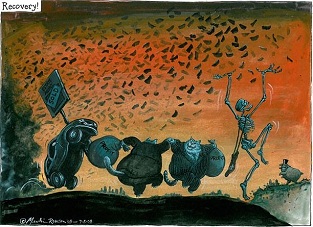QE - Quantitative Easing or Questionable Economics?
Wikipedia dryly defines QE as: "The term quantitative easing describes a monetary policy used by central banks to increase the supply of money by increasing the excess reserves of the banking system. This policy is usually invoked when the normal methods to control the money supply have failed, i.e the bank interest rate, discount rate and/or interbank interest rate are either at, or close to, zero."
We all know QE stands for Quantitative Easing; a better description would be Questionable Economics. The Bank of England has just announced QE2, where £75bn is being electronically created and pumped into the banks. This is in addition to QE1, the £200bn injected in 2009 in exchange for mainly government bonds. The more I read about this system of finance, the more convinced I become that this is a racket that enriches the banks and endangers the real economy, with many economists arguing that it makes the current dire economic situation worse. The aim of the Bank of England is to enable the banks to lend to small businesses and entrepreneurs to create growth in the economy. The banks failed to meet their lending targets with project Merlin, using the first £200bn. The government hopes the banks will do more this time with the additional £75bn in their coffers. Why they believe this has not been explained. Why should the banks lend more to businesses if greater profits can be made elsewhere?
Sir Terry Leahy, the former boss of supermarket Tesco, is quoted in the Independent saying:
"QE created an awful lot of liquidity intended for the real economy, but found a home in markets and speculators looking for quick returns."
This view is supported by a number of economists. Dhaval Joshi of BCA research in a new report, the findings of which are presented in the Guardian, argues that:
“QE1 [£200bn] – combined with Bernanke's much larger US asset purchases – just handed banks lots of extra money which they used to speculate on commodities such as oil, boosting their price, pushing up inflation and making life even harder for cash-strapped consumers.”
The Bank of England tells us that the initial £200bn boosted GDP by 1.5 %. Where did this growth go, and how did it help anyone? Here is Dhaval Joshi again:
"The evidence suggests that QE cash ends up overwhelmingly in profits, thereby exacerbating already extreme income inequality and the consequent social tensions that arise from it."
The report continues:
“Real wages – adjusted for inflation – have fallen in both the US and UK, where QE has been a key tool for boosting growth. In Germany, meanwhile, where there has been no Quantitative Easing, real wages have risen…The shocking thing is, two years into an ostensible recovery, [UK] workers are actually earning less than at the depth of the recession. Real wages and salaries have fallen by £4bn. Profits are up by £11bn. The spoils of the recovery have been shared in the most unequal of ways."
QE hails from Japan, where it was used repeatedly and failed to stave off deflation and recession in the 1990’s, with their recession lasting 15 years. It is somewhat bizarre that some economists concluded not that QE does not work, but that it was not used early and aggressively enough for it to work! Follow the money might be the explanation for this conclusion.
It is clear that even if the aim of QE is realised, namely pumping money into businesses, it is not actually addressing the problem. Incomes for the many, due to depressed wages and unemployment, are barely adequate for survival, leaving very little to spend on services and goods dreamt up by those clever entrepreneurs. The real problem is the huge wealth gap that exists between the very rich and the poor that is choking demand. QE, many economists agree, is likely to make the situation worse, resulting in a vicious circle of inequality and deprivation that threatens the cohesion of our society.
___________________________________________________________________________________
Dr Adnan Al-Daini took early retirement in 2005 as a principal lecturer in Mechanical Engineering at a British University. His PhD in Mechanical Engineering is from Birmingham University, UK. He has published numerous applied scientific research papers covering heat transfer, fluid flow and energy utilization in many industrial applications. He is a British citizen born in Iraq. Since retirement he has devoted his time and energy to building bridges and understanding between minority communities, particularly the Muslim community and the wider community in the South West of England. He was Chair of Devon Racial Equality Council between 2007/8. Adnan is a contributing writer for the Huffington Post.
___________________________________________________________________________________
Cartoon: Martin Rowson (The Guardian)
URL: http://www.a-w-i-p.com/index.php/2011/10/11/qe-quantitative-easing-or-questionable-e

























